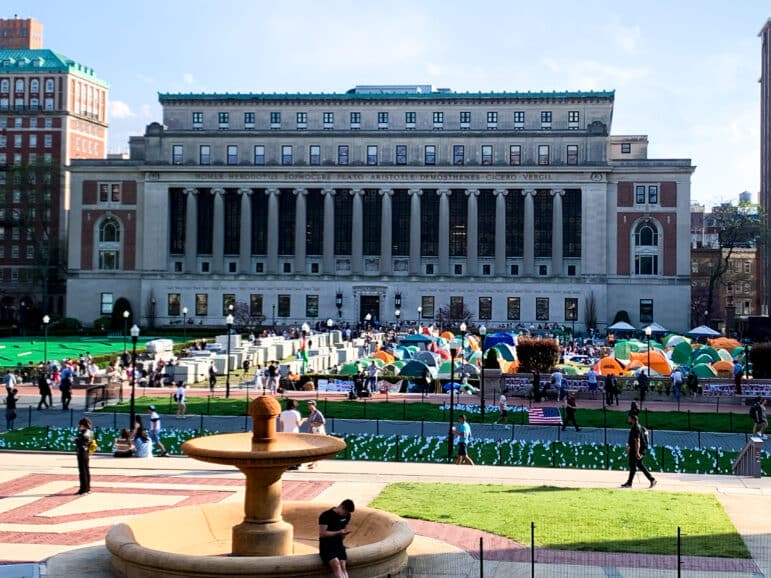
A Message From Center for Earth Ethics Regarding the Columbia University Protests
In the past month, we have witnessed student protests on the Columbia University campus and elsewhere, and we want to share thoughts that guide our understanding of this complex and charged situation.
First, the free expression of moral conscience is key to making necessary social change. Most of the protestors come from this place. They object to the role that the institutions they belong to are playing in facilitating the massacre of tens of thousands of vulnerable people in Gaza (many of them children), an assault that threatens to kill more, including through starvation. The geopolitical circumstances may be complex, but that should never be used as an excuse to silence moral conscience.
An outsized police response to peaceful protests is unacceptable, especially on a campus—and in a community—where sharing ideas, even controversial ones, is essential. The encampments encompass forms of expression that challenge norms of how we conceive of and inhabit common spaces—intellectually, emotionally, spiritually and physically. We recognize that this involves infractions of rules, which might generate an administrative response, but police marching into campus clad in riot gear and armed with military-grade equipment was deeply inappropriate.
We are deeply concerned about instances and allegations of antisemitism during the protests. Any disparagement, discrimination or violence against Jewish people should be immediately countered. The horror of the October 7th Hamas attack and the urgent need to secure release of the hostages Hamas is holding cannot be minimized. We also lift up what we have witnessed, heard and learned from our Jewish friends and colleagues who are fierce critics of the Netanyahu government’s policies: to label such criticism as “antisemitic” insults the term’s true meaning and the pernicious force that it represents.
We are no less concerned that many Muslim and Arab students have experienced marginalization and violence. A long history of Islamophobia in the United States means that their viewpoints are misrepresented as dangerous and often excluded in public debate. These instances of prejudice should also be taken seriously by university administrators—in many cases they have not been.
As an organization focused on earth ethics, we know that industrial-scale violence against human communities is also an assault against the environment and the interconnected web of life. War not only imposes devastating impacts on the natural and built environments, it also disrupts and destabilizes ecological relationships and biocultural knowledge that communities have developed. We grieve that the ongoing human tragedy in Gaza will be compounded for years to come because of this wanton destruction.
Finally, respect for international law is essential to our ability to solve global challenges, including the climate crisis. The U.S. government has regularly obstructed U.N. processes to hold Israel to account under international law, which must be respected and applied equally. Inflicting horrific violence on a whole people—even if it is never officially labeled “collective punishment” or “ethnic cleansing” or “genocide” or “war crimes”—does more to generate another cycle of violence than to eradicate a terrorist threat.
As a species, we must reject individual and systemic violence if we are to confront the many difficult issues that challenge us during our brief lives on this shared planet. Resolving these issues will require cooperation and understanding among peoples and nations. The leaders who hold the reins during these treacherous times must be guided by the wisdom of moral conscience.
Related Communications from Union Theological Seminary
- “President Jones’ Statement on the Columbia University Protests.” (President Serene Jones).
- “Union Theological Seminary Board of Trustees Endorses Divestment and Other Strategies for Companies Profiting From War in Palestine/Israel.” (UTS Board of Trustees).
- “What I learned watching suspended Columbia students share a meal with my community.” (President Serene Jones).
- “What we have to learn from students leading the charge for justice.” (President Serene Jones).
